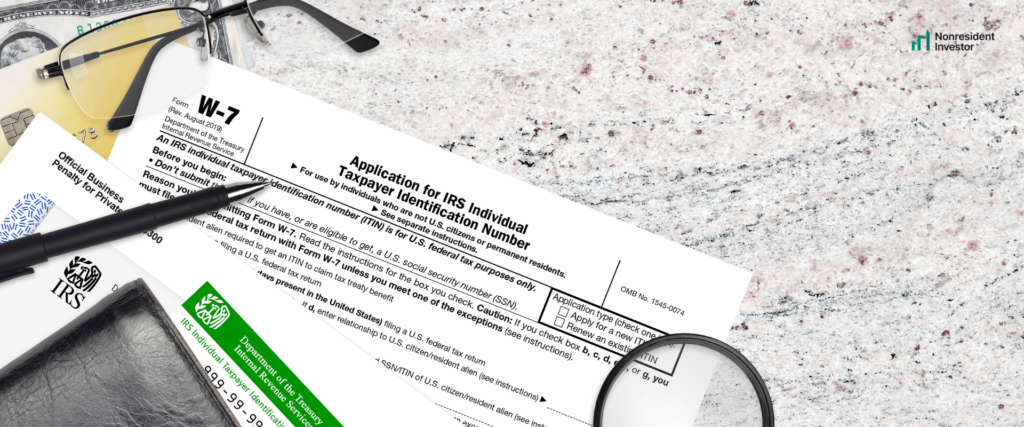The easiest way to secure funding for your first real estate investment in the US as a foreigner is by getting a loan. However, it is smart to build credit score with ITIN for most American banks even to consider giving you one.
The reason is simple — credit score is a numerical representation of your financial liquidity. And banks use it to assess how financially reliable and solvent you are.
Whether you want the best odds of securing a loan for your first investment, buying a car in the US, or have just moved to the States and want to enter their financial system, you’ll need to build your credit score. The good news is that, yes, even foreigners can do it. But the bad news is that it will be much harder than if you were a US citizen.
This article will teach you everything you need to know about building your credit score as a nonresident investor. We will cover what credit score is, what you’ll need to build it, and how to do it the easiest.
But before you can even consider building your credit score, you will need a social security number (SSN) or an ITIN. So let’s start from the beginning…

What Is an ITIN?
ITIN, or an Individual Taxpayer Identification Number, is a number given to nonresidents for processing taxes in the States. In other words, if you’re a foreigner who needs to pay taxes in the US (usually because you have a business on American soil), you’ll be eligible to receive an ITIN.
This number is a good, albeit inferior, alternative to a social security number (a unique number issued to all US citizens). Having an SSN comes with various government-issued benefits that all citizens enjoy (e.g., private insurance), which ITIN holders don’t have.
How Do You Get an ITIN as a Foreigner?
Getting an ITIN as a foreigner is pretty straightforward. You just need to meet two conditions:
- You must have a reason for needing a way to file taxes in the US — the most common ones are being married to a US citizen or having a US LLC;
- You must earn and maintain the status of a nonresident alien — you can do that by submitting the 1040 NR form after meeting the necessary conditions;
After meeting these conditions, you must file the W-7 Form with the IRS to apply for an ITIN. The only other documents you’ll need are proof of your nonresident alien status and identity (e.g., driver’s license, passport).
Need help getting an ITIN? Our team can take care of the entire process for you.
ITIN vs. Social Security Number
Although you can build your credit score with either an ITIN or a social security number, the two aren’t the same. Having an SSN gives you more rights and opportunities than an ITIN.
The reason is that an SSN gives you all the benefits of being an American citizen (e.g., access to the US Social Security system). On the other hand, ITIN only serves as a replacement for an SSN to pay taxes (usually as a foreign business owner).
Considering the above, it shouldn’t be surprising that most institutions, like banks and mortgage lenders, look at clients with an SSN more favorably than those with an ITIN. In fact, some banks and agencies won’t even talk to you about loans without an SSN.
While finding someone to give you a loan with an ITIN is possible, it will be much harder than with an SSN. So if you can get a social security number, do it — it will make your life much easier.

Can Foreigners Get a Social Security Number?
While all American citizens get a social security number at the age of 12, for foreigners, it’s a whole different story. Nonresidents don’t usually have the right to apply for an SSN, but there are a few exceptions. Namely, foreigners can apply for a social security number if they have one of several non-immigrant visas. Here are a few cases in which you may be eligible for one of those visas:
- If you’re an exchange student;
- If you’re a foreign investor with a substantial investment portfolio;
- For cultural exchange visitors;
- If you’re employed by a US company;
- For individuals married to a US citizen;
- If you are receiving asylum;
- And more…
You can find a complete list of non-immigrant visas that grant you the right to a social security number on the United States Department of State’s website. When applying for any of these visas, you’ll have the option to request an SSN in the same application form.
Now that you know what you need to be able to build credit score as a foreigner, let’s see what credit score actually is and how you can build it.
What Is Credit Score?
Credit score is a numerical value assigned to an individual taxpayer that represents their financial liquidity. In other words, it’s a number that illustrates the health of your finances and your creditworthiness.
Banks and other financial institutions are some of the best institutions in the world at conducting risk assessments. And they use this number to evaluate whether they should hand you out a loan or do other business with you.
The reason is simple — a person with a low credit score might be in too much debt and would have trouble paying back their loans. On the other hand, an individual with a good credit score shows that they have reliable cash flow and are financially stable.
Credit score is always tied to your personal US bank account, which you need to open before you can start building it. Once you’ve done that, you can gradually build your credit score.

What Parameters Are Used to Calculate Credit Score?
Although the exact formula for calculating credit score isn’t public knowledge, the five main factors that go into calculating it are. Here are the main parameters that go into calculating your credit score and how much they weigh:
- Payment History (35%) — This factor relates to whether you pay your loans and credit accounts consistently and on time.
- Amount Owed (30%) — This parameter represents the ratio between your debt and your available credit. Borrowers who regularly spend more than their credit limit are considered high-risk clients.
- Length of Credit History (15%) — The longer you use the US credit system, the better. Banks and lenders prefer clients who’ve been regularly paying their credits for a decade over someone who’s been doing it for a few years.
- New Credit (10%) — This factor reflects the frequency at which you apply for credits. Users who take out loans more frequently present a higher risk for lenders since it may indicate financial instability.
- Credit Mix (10%) — This parameter represents how many different types of credits you can successfully manage (e.g., credit cards, mortgages, car loans). If you can manage multiple of these credits simultaneously, that’s a good indicator of your financial stability. However, having too many will create the opposite effect. It’s best to have 2–3 for optimal results.
How Can Foreigners Build Credit Score?
Once they acquire an ITIN or an SSN, foreigners can build credit score like Americans. Overall, there are several things you can do to develop and maintain your credit score:
- Building credit history by getting a credit card and using it;
- Taking out a credit-builder loan;
- Becoming an authorized user of your spouse’s account (if you’re married to a US citizen);
- Paying rent, bills, or taxes regularly;
- Not taking up too much debt.
- It will be useful for the ITIN mortgage loan application.
As you can see, there is no quick way to build credit score. After all, the system is built to encourage consistency, so the older your account and financial activity in the US are, the better your credit score will be. In other words, you’ll have to play the long game.
Still, one crucial thing you should do to maximize the speed at which you build your credit score is to keep your credit utilization low. That means you should use just a fraction of your credit limit (ideally, less than 30%). There lies the sweet spot for gaining the optimal credit score.
But if you get anything above 50%, banks and lenders will label you as a high-risk client and refuse to give you any mortgage loans.
Do Foreign Real Estate Investors Even Need High Credit Score?
Even though getting a loan for investing in US real estate is much easier with a good credit score, the truth is that you can make do even without it. The biggest reason you’d want a high credit score is if you wanted to move to the States with a real estate investor’s visa.
But if you’re content with remaining abroad while investing in US real estate, there are a few workarounds.
Some institutions will allow you to transfer your home country’s credit score and present it as a reference when requesting a loan. However, that applies only to countries that follow a similar credit score system as the US.
If you don’t live in such a country, there are still many international home loans and residential real estate loans that some vendors will hand out even without credit score. But one of the most notable ways for foreigners to finance properties in the US is a specialized DSCR loan.
A DSCR loan is a specialized loan given out to real estate investors that judges whether your property generates enough income to cover the expenses of this loan. That makes it a low-risk endeavor for lenders and an excellent opportunity for investors (since the property essentially pays for itself in time). So the higher your property’s cash flow is, the better the odds of your finding a lender will be.
Note that this loan usually requires a high credit score, but some institutions will give it out even to foreigners without it. However, finding them won’t be easy without help…

